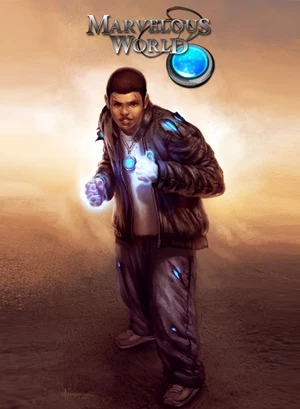The Greatest Story Never Told
 When author Troy Cle wrote his debut fantasy novel, The Marvelous Effect (Book 1 of the Marvelous World Saga), he didn't think twice about the book's main character because Cle already knew whom to depict his hero after: himself. In The Marvelous Effect, a seemingly normal 13-year-old boy named Louis Proof has just woken up from a three-month coma to find the normal life he left in a completely different state. Proof has been chosen to become a Celestial-like Entity (CLE) that enables him with superhuman strength and futuristic vehicles, which will help Proof, fight the Celestial Entities (CEs) who are ruining planet Earth.
When author Troy Cle wrote his debut fantasy novel, The Marvelous Effect (Book 1 of the Marvelous World Saga), he didn't think twice about the book's main character because Cle already knew whom to depict his hero after: himself. In The Marvelous Effect, a seemingly normal 13-year-old boy named Louis Proof has just woken up from a three-month coma to find the normal life he left in a completely different state. Proof has been chosen to become a Celestial-like Entity (CLE) that enables him with superhuman strength and futuristic vehicles, which will help Proof, fight the Celestial Entities (CEs) who are ruining planet Earth.
But what really sets precedent in The Marvelous World series aren't any magical powers possessed by the protagonist (as Cle notes, Louis Proof doesn't have any). Rather, it's Louis Proof's race. Proof is an African-American hero in a genre where there are few if any. This of course has many media outlets comparing Cle's work to another popular fantasy character. "The difference between Louis Proof and Harry Potter is Louis Proof will go at you from the door,†says Cle when asked about the black Harry Potter tag Proof is often given. "It just sounds like a gimmick, at the same time, it is an attention grabber.â€
In a conversation with KING-MAG.com, the 28-year-old Cle talks about how the film The Goonies inspired the Marvelous World books, the responsibility of being a black fantasy book author, Harry Potter comparisons, and how he plans on making that George Lucas money.
KING-MAG.com: What was your inspiration for the Marvelous World series?
Troy Cle: It just stems from me wanting to be a Goonie. I always wanted to create a project like that, so I could, in the future, make a movie. At the same time, I was just dissatisfied with what I was reading. For what I wanted to read, I wasn't being engaged. To remedy that, I said, "Hey, I write this to excite myself."
Your book isn't completely fantasy. There are a lot of elements in The Marvelous Effect steeped in reality. Why not just write something closer to real life?
The truth is, the book is basically a distorted and exaggerated version of my own life. I was always exaggerating stuff. One time I had broken something, and I told my mother the house fell on it. Not just lied about it, came up with an extra lie. That's where my entire mindset was, like, Let's have fun, let's do fantasy. And I think a lot of kids have been robbed of that.
Do you think that's because some of the most popular entertainment today is hip-hop music claiming to depict the reality of the streets?
I'm not blaming anything on hip-hop, but our generation [believed] you could actually be a Goonie. I love all this music that is out now. It was a different era that I grew up in, that's all. Hip-hop did not have the same face it has now. You had your A Tribe Called Quests, you had your Black Sheeps, those were our primary influences, which were much lighter, as opposed to now.
When people read this series, they might think other series like Harry Potter influenced you. Does it bother you when people call Louis Proof and Marvelous World the black Harry Potter?
It has its pros and its cons. The thing is if you read the book, you totally know that Marvelous World is in its own lane. If Louis Proof were a cartoon, there wouldn't be that comparison. It's just because it's literature, that's all. And that's normal.
So you'll run with that comparison?
Here's the thing, this is where I've run into problems. The book is not being understood as far as what exactly it is, if it keeps going out there – the black Harry Potter – it just sounds like a gimmick. I'm just trying to get away from that.
You're signed to two major publishing houses: Simon and Schuster and Random House - a book deal and an audio book pact, respectively. Did you ever think you could live large off your work?
I never thought of it that way, from what I was exposed to as a kid, it wasn't like, I'm going to play ball. I did play ball but I never thought, Yo, that's going to be my thing. I'm looking at George Lucas from when I'm a little kid, and I'm like, if everybody's salary is paid for that year, and he brings in x amount of money, he gets to pocket most of that. And my equation may not be correct, but I'm saying that's where my mind was. And for me, I want to be in my own lane. I really wanted to write this book, nobody else was doing it, so it just pushed me more and more to do it, so I could be unique.
Well, it's definitely unique to hear about a black author who writes fantasy novels, especially where the super hero is black too. What do you hope people get from those two things?
The bigger message of [Marvelous World] is if you have kids that aren't of color, and they're just reading along with Louis Proof as a regular human character, I think that will instill a different type of respect and appreciation for people of color.
And what about you being a role model to young black youth?
I know that if I fail at this, it makes it harder for anyone else to try to write a book, because it took them so long for them to let something like this in the door. For whatever reason, people weren't submitting it, it wasn't being written. It just puts a lot of responsibility on me to make sure my project pops because it'll open the door for more people to do it. It'll be more and more authors that are like, "Oh Wow, maybe I can write in this genre.†As long as it's good, go for it.
Troy Cle's The Marvelous Effect (Book 1 of the Marvelous World Saga) is available in stores now.
More From King








